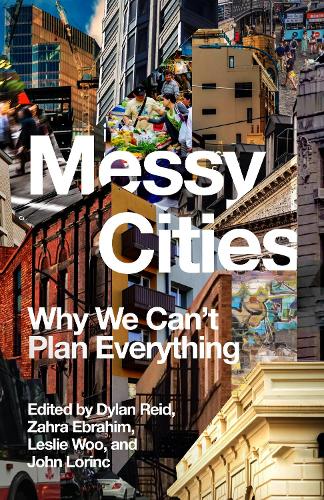
Messy Cities: The Case for Navigating Urban Disorder
(Paperback)
Publishing Details
Messy Cities: The Case for Navigating Urban Disorder
By (Author) Zahra Ebrahim
Edited by John Lorinc
Edited by Dylan Reid
Edited by Leslie Woo
Coach House Books
Coach House Books
10th September 2025
Canada
Classifications
General
Non Fiction
Human geography
Urban and municipal planning and policy
307.76
Physical Properties
Paperback
300
Width 139mm, Height 215mm, Spine 12mm
498g
Description
Crowded streets, sidewalk vendors, jumbled architecture, constant clamor, graffitied walls, parks gone wild: are these signs of a poorly managed city or indicators of urban vitality
Messy Cities: The Case for Navigating Urban Disorder argues that messiness is not a liability but an essential element in all thriving cities. Forty essays by a range of writers from around the world illuminate the role of messy urbanism in enabling creativity, enterprise, and grassroots initiatives to flourish within dense modern cities.
With pieces on guerrilla gardening, facadism, queer ecology, and decolonizing public engagement, Messy Cities makes the case for embracing disorder while not shying away from confronting its challenges.
Author Bio
Zahra Ebrahim is an urbanist, educator, and strategist. Her award-winning work focuses on building bridges between institutions and their public, working with communities to co-design towards better social outcomes and leading some of Canada's most ambitious participatory infrastructure and policy programs. She currently co-leads Monumental, a national organization focused on projects that advance fair, just, and culturally competent citybuilding, with previous experience leading organizations across multiple sectors. She is currently an Adjunct Professor at the Daniels School of Architecture and Urbanist-in-Residence at the University of Toronto's School of Cities. She currently lives in Toronto with her partner, and their whippet, Zada.
John Lorinc is a Toronto-based journalist and editor. He writes about cities, climate, and cleantech for a range of publications, including the Globe and Mail, Toronto Star, Corporate Knights and Spacing, where he is senior editor. John is also the Toronto non-fiction editor for Coach House Books, and has edited or co-edited several uTOpia anthologies, including The Ward, Any Other Way, and House Divided. He is the author of five books, including Dream States: Smart Cities, Technology and the Pursuit of Urban Utopias, which won the 2023 Writer's Trust Balsillie Prize for Public Policy. John's latest book is a family memoir entitled No Jews Live Here (Coach House, 2024).
Dylan Reid magazine, an award-winning print quarterly about Toronto urbanism and public space that recently celebrated its 20th anniversary. He is the author of the Toronto Public Etiquette Guide and co-editor of other books about Toronto. He was co-chair of the city government's Toronto Pedestrian Committee and later co-founder of the advocacy group Walk Toronto. He is also a fellow at the Centre for Renaissance and Reformation Studies at the University of Toronto, and author of several scholarly articles about the history of cities in Renaissance France.
Leslie Woo is a dynamic tri-sector athlete known for her expertise in uniting public, private, and not-for-profit leaders to co-create innovative urban policy solutions. With over 30 years of experience as an urban planner, architect, and community activator, she has been central to shaping urban development in Canada's largest metropolis. Leslie serves on the boards of Waterfront Toronto and the Yee Hong Centre for Geriatric Care and is a trustee of the Urban Land Institute. A Senior Fellow at the University of Toronto's Munk School of Global Affairs and Public Policy, Leslie champions women city builders on her blog shebuildscities.org
